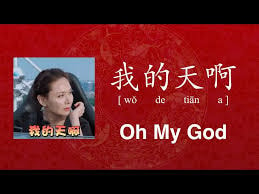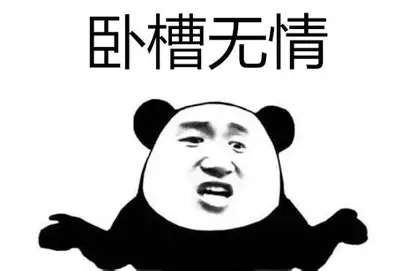5 Ways: How to Say “Oh My God” in Chinese
Want to genuinely express surprise, shock, or react to disappointing news like a native speaker? Forget direct translations! Chinese offers a vibrant range of phrases packed with strong emotions, deeply influenced by culture.
Chinese people, especially the younger generations, use specific Chinese slang and spoken language to react naturally. Today, WuKong Chinese will teach you the five most common ways to convey that “OMG” feeling, complete with examples and cultural insights. Hope you find it fun and useful!
1. 我的天啊!(Wǒ de tiān a!) – “My Heaven!”

- Word’s Function: The most direct equivalent expressing shock, disbelief, or awe. It’s versatile and widely accepted.
- Emotion: Pure surprise, shock (both pleasant and unpleasant), sometimes worry. Less intense than others.
- Examples:
- Seeing shocking news: “Wǒ de tiān a! Nàlǐ yǒu dìzhèn!” (我的天啊!那里有地震! – OMG! There’s an earthquake there!)
- Hearing surprising gossip: “Wǒ de tiān! Tāmen jiéhūn le?” (我的天!他们结婚了? – OMG! They got married?)
- Usage: Common across ages. A safe, go-to phrase. Literally means “My Heaven!”
2. 哎呀!(Āiyā!) / 哎哟!(Āiyō!) – The Universal Exclamation

- Word’s Function: An incredibly versatile interjection covering surprise, pain, frustration, annoyance, or even slightly mocking sympathy.
- Emotion: Broad range: mild surprise, disappointment, exasperation, “ouch,” “oops,” “darn it.”
- Examples:
- Dropping your phone: “Āiyā! Wǒ de shǒujī!” (哎呀!我的手机! – OMG/Darn it! My phone!)
- Hearing disappointing news: “Āiyō, tā méi tōngguò kǎoshì.” (哎哟,他没通过考试。 – Oh no/Aww, he didn’t pass the exam.)
- Reacting to something slightly silly: “Āiyā, nǐ zěnme zhème bèn a!” (哎呀,你怎么这么笨啊! – Oh my, how can you be so silly!)
- Usage: Extremely common in spoken language by everyone. Tone and context are crucial! Native speakers use this constantly.
3. 我(的)妈呀!(Wǒ (de) mā ya!) – “My Mother!”

- Word’s Function: Expresses stronger shock, fear, or disbelief, often bordering on alarm. The “de” (的) is often dropped.
- Emotion: Intense surprise, fright, “holy cow/moly,” sometimes used humorously for exaggeration.
- Examples:
- Seeing a huge spider: “Wǒ mā ya! Hǎo dà de zhīzhū!” (我妈呀!好大的蜘蛛! – OMG! Such a big spider!)
- Hearing a sudden loud noise: “Wǒde mā ya! Shénme shēngyīn?” (我的妈呀!什么声音? – Holy cow! What was that sound?)
- Usage: Very natural and expressive. Conveys a certain emotion of being startled or overwhelmed.
4. 不是吧?!(Bù shì ba?!) – “It can’t be, right?!”

- Word’s Function: Expresses disbelief, shock at unexpected (usually negative or hard-to-believe) news. Focuses on incredulity.
- Emotion: Shock mixed with doubt, disappointment, “No way!”, “You’re kidding!”
- Examples:
- Hearing shocking/disappointing news: “Shénme? Tā cízhí le? Bù shì ba?!” (什么?他辞职了?不是吧?! – What? He quit? No way?!)
- Reacting to an unfair result: “Wǒ méi jìnlù? Bù shì ba!” (我没录取?不是吧! – I didn’t get in? It can’t be!)
- Usage: Extremely common, especially among young people. Perfect for that sinking feeling of disbelief. The question mark and rising tone (?) are essential.
5. 我靠!(Wǒ kào!) / 卧槽!(Wòcáo!) – The Chinese Slang (Use with Caution!)

- Word’s Function: Very strong, informal slang expressing extreme shock, anger, frustration, or even admiration (context-dependent). Wòcáo is often stronger/more vulgar.
- Emotion: Intense shock, strong anger, “Holy sht!”, “Damn!”, “No fcking way!” Can also express awe (“Damn, that’s cool!”).
- Examples (Use cautiously!):
- Extreme surprise/frustration: “Wǒ kào! Chēzi bèi guā le!” (我靠!车子被刮了! – Damn! The car got scratched!)
- Reacting to something incredibly cool (informal): “Wòcáo! Zhège tài niú le!” (卧槽!这个太牛了! – Holy shit! This is so awesome!)
- Usage: Primarily used by younger generations in very informal settings with close friends. Highly informal and potentially offensive depending on the audience and tones. Avoid with elders, superiors, or in formal situations. Literally means something vulgar (“I rely on…” / “Crouch F*ck”), though the vulgar meaning is often softened in casual exclamation.
How to Say Oh My Gosh in Chinese?
Why Not Just Say “My God”?
In China, the concept of “God” (Shàngdì, 上帝) isn’t central to everyday emotion like in some cultures. Literally means “Oh my god” (“Wǒ de shàngdì a”, 我的上帝啊) sounds unnatural and overly religious to most native speakers. Instead, expressions often reference “heaven” (tiān, 天) or use unique interjections.
Learn authentic Chinese from those who live and breathe the culture.
Specially tailored for kids aged 3-18 around the world!
Get started free!Casual Expressions of OMG
Internet Slang/Youth Expressions:
“卧槽 (wò cáo)”: A strong exclamation for shock or frustration (note: can be vulgar in formal settings).
“哇塞 (wā sāi)”: A colloquial term for amazement (originally from Hokkien).
“绝了 (jué le)”: Means “unbelievable” or “awesome” (e.g., “This is insane!”).
Regional Variations:
Cantonese: “唔系嘛?” (“Really?”) or “哇佬!” (“Wow!”).
Taiwanese Hokkien: “夭寿喔!” (“Oh my goodness!”).
How to Sound Natural: Key Tips
- Tone is Everything: Chinese is tonal. The emotion is conveyed heavily by your intonation. Shrill, high tones show shock; low, drawn-out tones show disappointment or annoyance. Watch native speakers (in videos or real life) and listen carefully!
- Context is King: Choose the phrase that fits the degree and type of surprise/disappointment. Use “Āiyā” for minor spills, “Wǒ de tiān” for bigger news, and save “Wòcáo” for extreme moments with close friends.
- Know Your Audience: Be mindful of formality. “Wǒ de tiān” and “Āiyā” are safest. Avoid “Wòcáo/Wǒ kào” unless you’re certain it’s appropriate.
- Listen & Practice: The best way to learn is to hear these phrases used naturally. Watch Chinese dramas, variety shows, or videos online (Facebook, YouTube, Bilibili). Pay attention to how native speakers react.
- Don’t Force Literal Translations: Mandarin expresses these strong emotions differently. Embrace the unique vocabulary and phrases that have developed naturally within the language and culture.
FAQ About How to Say “Oh My God” in Chinese?
How to Say “Oh My God” in Chinese?
The most common way to say “Oh my God” in Chinese is “我的天哪(wǒ de tiān nǎ)” or simply “天哪(tiān nǎ)”. Another option is “我的天啊(wǒ de tiān a)”. These phrases express surprise, shock, or dismay, similar to the English phrase “Oh my God.
How to Say Oh My God in Cantonese?
In Cantonese, you can say “Oh my god” as “Wah lau” or “Wah sei” for an exclamation.
Conclusion
Next time you need to express surprise or react to shocking or disappointing news in Mandarin Chinese, ditch the direct “Oh my god” translation. Reach for the natural, expressive power of “Wǒ de tiān a!” for general shock, the versatile “Āiyā!” for minor mishaps, the alarmed “Wǒ mā ya!”, the disbelieving “Bù shì ba?!”, or (with caution among friends) the edgy “Wòcáo!”.
Understanding these Chinese words and their emotion, context, and slightly mocking or unpleasant potential tones will make your spoken Chinese sound infinitely more authentic. So open your browser, search for examples, watch some videos, practice the sounds, and get ready to react like a local! Got questions or a favorite phrase? Comment below – we’d love to hear your answer!
If you want to learn more about Chinese culture, you can click the link below. Wukong Education will continue to accompany your learning.
Learn authentic Chinese from those who live and breathe the culture.
Specially tailored for kids aged 3-18 around the world!
Get started free!
Master’s degree from Yangzhou University. Possessing 10 years of experience in K-12 Chinese language teaching and research, with over 10 published papers in teh field of language and literature. Currently responsible for teh research and production of “WuKong Chinese” major courses, particularly focusing on teh course’s interest, expansiveness, and its impact on students’ thinking development. She also dedicated to helping children acquire a stronger foundation in Chinese language learning, including Chinese characters, phonetics (pinyin), vocabulary, idioms, classic stories, and Chinese culture. Our Chinese language courses for academic advancement aim to provide children with a wealth of noledge and a deeper understanding of Chinese language skills.









![9 Best Platform for Free Mandarin Courses [2025 Updated] 9 Best Platform for Free Mandarin Courses [2025 Updated]](https://wp-more.wukongedu.net/blog/wp-content/uploads/2024/02/image-428-520x293.png)













![Best Guide to Saying Yes in Chinese [2025 Guide] Best Guide to Saying Yes in Chinese [2025 Guide]](https://wp-more.wukongedu.net/blog/wp-content/uploads/2024/01/image-507-520x293.png)

![Learning Chinese For Kids: 5 Best Resources For Chinese Online [2025] Learning Chinese For Kids: 5 Best Resources For Chinese Online [2025]](https://wp-more.wukongedu.net/blog/wp-content/uploads/2024/01/image-173-520x293.jpeg)
![Popular 5 Ways to Say Happy New Year in Cantonese [2025] Popular 5 Ways to Say Happy New Year in Cantonese [2025]](https://wp-more.wukongedu.net/blog/wp-content/uploads/2024/01/image-42-520x293.png)

Comments0
Comments